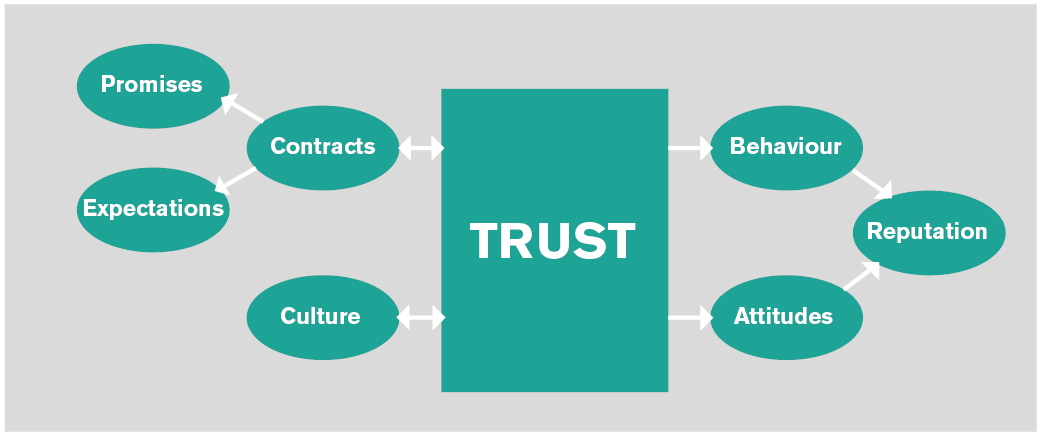Trust and the Psychological Contract
Between Employers and Employees
Why does trust matter?
An organisation’s trustworthiness can attract top talent, retain customer loyalty, build valuable partnerships, win and retain critical contracts and limit the negative impact when things go wrong. Crucially, trust maintains psychological contracts, which in turn improve employee loyalty as well as increasing efficiency and productivity. As a result, these factors can both internally and externally increase an organisation’s reputation, which creates a more effective and efficient workforce as well as allowing access to a wider pool of stronger candidates. Trust is not a luxury concept, it is a necessity, and an important asset for an organisation. As Jacqueline Oliveira - founder of Faeron Communication, professional training and coaching business that devised the “creating a culture of trust” series, explains: Trust is coloured by culture - we don’t see beliefs, we see behaviours. Organisational culture impacts productivity, creativity and morale, and when trust isn’t present, these are the factors that plummet first.
Low or no trust within organisations is associated with numerous dysfunctional outcomes such as:
Lower staff retention rates, which itself indirectly effects talent acquisition and reduces effectiveness
Counter productive work behaviour and eventually, employee cynicism
Both of these outcomes can lead to slowed and even halted growth, along with negative consequences for the organisation’s reputation. Loss of reputation can then affect the calibre of candidates the business attracts, creating knock on affects that are detrimental in the long term.
What is a psychological contract?
The term ‘psychological contract’ refers to individuals’ expectations, beliefs, ambitions and obligations, as perceived by the employer and the worker. The concept emerged in the early 1960s and is important in understanding the nuances of employment relationships. There are two main types of psychological contracts; transactional and relational. Transactional contracts are economic in nature and often temporary, i.e., employer provides money in exchange for employee productivity. Relational contracts in contrast, develop a long-term, mutually beneficial relationship between the employee and employer often including training and development, career opportunities and job security.
The types of psychological contracts essentially describe how the parties themselves understand their relationship, their own views of commitment and what they can expect to receive in return. In many senses, the psychological contract, intangible in nature, may be more influential than it’s tangible counterpart, a legal contract of employment. Essentially, the psychological contract is built on the everyday actions and statements made by one party and how they are perceived and interpreted by the other.
Broadly, psychological contracts often cover the following aspects of an employment relationship:
Job security
Career prospects
Employer’s reputation
Manager support
Training and development
Perceived fairness of pay and benefits
The quality of psychological contracts heavily influences how employees behave from day to day, they convey fundamental messages about the amount of engagement expected from individuals. Maintained psychological contracts, particularly those of the relational kind, are what generate positive behaviours, and indicate a higher level of organisational commitment, lower any intention to leave, and ultimately increases productivity. Maintenance of strong psychological contracts comes from management communicating frequently, effectively and having transparent processes’. When an employee perceives that the organisation has exceeded their psychological contract expectations, they are likely to respond with actions that will benefit the organisation.
However, unmet employee expectations easily lead to psychological contract breach which in turn negatively impacts trust, organisational citizenship behaviour, organisational commitments and performance, none of which bodes well for staff retention rates. Outcomes of psychological contract breach can lead to organisations incurring high costs, and negatively affect business operations. Research has shown that breaking the psychological contract has a quicker impact on attitude and behaviour in comparison to the positive effects of psychological contract fulfilment.
Maintaining psychological contracts is essential to promoting organisational trust. Each can massively affect the other. If the psychological contract is breached, the trust will be lost.
Trustworthiness and psychological contracts are directly linked via another important organisational trait: integrity. We naturally expect people to adhere to what they say and do as this should be based on an individual’s belief system or their values/principles.
Potential employees form perceptions of organisations as early as the recruitment stage. Before even entering the organisation, it is at this point that psychological contracts begin to be made. When entering an organisation, new recruits subconsciously begin to benchmark their original perception with what they are now experiencing this in turn can lead to altering, confirming or breaking the initial psychological contract.
Therefore, it is essential organisations act in line with the culture the employee had perceived during the recruitment processes. The best way for your organisation to ensure individuals form accurate perceptions of culture and therefore have realistic psychological contracts is to hire correctly.
Job descriptions should honestly reflect company values, so candidates can decide whether or not those values are in line with their own. If your values resonate with them, there is a lower chance of a breach in their psychological contract.
Using a realistic job preview enables you to show candidates an actual ‘day in the life of’. This means you can show applicants how people treat each other in the company, how people work and collaborate. In other words, a realistic job preview is a great opportunity to demonstrate to the candidates the culture so they can form psychological contracts accordingly. If the employee and employer expectations are not aligned, a breach of psychological contract is likely to occur. This can negatively affect job satisfaction, commitment and performance; as employees believe that the employer is not honouring the ‘deal’ between them.
The psychological contract is a dynamic concept that can be applied to understand the individualistic nature of varying employer-employee relationships. For many years, the focus has been on the more traditional contract which focused on the promise of job security. Now, psychological contracts focus much more on learning and development. Human capital is becoming increasingly recognised as a source of competitive advantage and to maintain this advantage, it is important to maintain and fulfil psychological contracts. Essentially, an effective psychological contract aligned with a company’s vision and strategy honoured can instil organisational trust and therefore obtain the highest performance, sustain productivity and retain the top talent.
CRSI is a specialist support business that was founded to help early stage companies to grow at an accelerated rate. With methodologies developed over the past 20 years, our team can help you to design people strategies that will allow you to locate, secure and retain the people that will make your business fly. To find out more about what we can do for your business, contact Gordon Bateman - gordon.bateman@crsi.team.
References



![Trust and psychological contract draft rick].png](https://images.squarespace-cdn.com/content/v1/5d691fdfbf8dce0001ba1826/1606473358793-IHTR2TZ9D52AD94QA8IW/Trust+and+psychological+contract+draft+rick%5D.png)